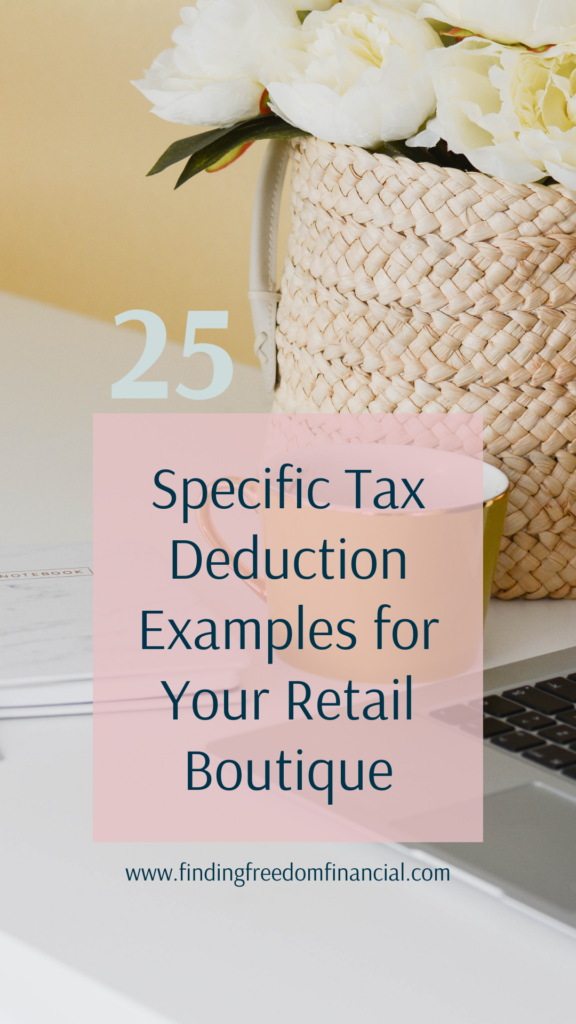25 Specific Tax Deduction Examples for Your Retail Boutique
As a business owner, it is your responsibility to report all income you’ve earned in your business when tax time comes around. You also have the OPPORTUNITY to report any and all business-related expenses that reduce that income, to reduce the amount of taxes you owe. These expenses are often referred to as tax deductions, or write-offs.
Generally speaking, you will be able to write off any expense that is ordinary & necessary in your type of business, with some exceptions and limits.

I’ve put together this list of 25 specific tax deductions examples you can write off in your retail boutique. While this is not an exhaustive list by any means, it gives a great place to start for what you should be tracking in your business. Be sure to consult with your tax professional to ensure that you are taking advantage of all the tax deductions you can with your boutique to pay as little in taxes as legally possible!
Tax Deduction Examples
Want a printable version of these tax deductions? Download your own copy here
1. Advertising & Marketing
- Cost of designing your boutique brand
- Printing business cards
- Signage for your boutique
- Email marketing platforms & social media scheduler apps
- Social media ads, or other ad space online or in print
- Being an event sponsor
2. Automobile Expenses
If you use a vehicle strictly for business use (like a mobile boutique truck), you’ll want to make sure it’s included in your bookkeeping records, and all related fuel, license and maintenance costs should be included in your bookkeeping records.
If you sometimes use a personal vehicle for business use (like driving to the post office to drop off packages), be sure to keep a detailed log of the miles you’ve driven for business purposes. Your normal commute to a brick & mortar location is not eligible to be considered business use. If you use your personal vehicle for boutique use, you can deduct certain costs using one of the following methods:
Standard Mileage Deduction
- You can deduct a flat $0.67 per business mile driven during the year 2024
Actual Cost Method
- Keep track of all costs related to operating your vehicle during the year (fuel, oil, repairs, maintenance, registration, insurance, etc…) and multiply that by the percentage of miles driven for business purposes. Be sure to record your odometer reading every January 1st so you can calculate the total miles driven during the year (not just business related ones)
3. Bank & Payment Processor Fees
- Service and overdraft fees for your business bank account
- Service fees for your business credit card
- Merchant service processing fees, such as those charged by Shopify, Square, Stripe, and Paypal
4. Business Insurance
- Property insurance
- Auto insurance for company vehicles
- Liability insurance
- Health, dental, vision, and life insurance for you and/or your employees
- Workers compensation
5. Business Licenses & Permits
- LLC filing & renewal fees
- Sales tax/resellers permits for all states necessary
- Any business licenses that may be required by your state, county, or city government agencies
6. Business Meals
This one can be tricky, so be sure to document the details for the meal regarding who attended, the location, and the business purpose of the meal in case questions come up at tax time. If business meals are going to be a part of your business, I recommend you set up 3 separate accounts in your bookkeeping software:
- Team Building Meals (100% deductible)
- ex: Food and beverage for a staff holiday party or team celebration dinners
- Working Meals (50% deductible)
- ex: Food & snacks provided to staff while they work; Business meals while meeting with suppliers or vendors
- Travel Meals (50% deductible)
- ex: Food and beverage purchased while traveling on business
7. Contract Labor
- Payment to an individual you hire to help complete a project or task that is not on your payroll.
- ex: models, social media managers, store cleaners
- NOTE: if you pay them more than $600 during the year, you may need to issue them a Form 1099 at the end of the year
8. Cost of Goods Sold
This will likely be your biggest expense as a retail seller. Your cost of goods sold deduction is going to be the cost of the items that you’ve SOLD to your customers, as the name suggests (not deducted when you purchase them – those are recorded as an inventory asset).
On your tax return, your cost of goods sold is calculated as follows:
Cost of beginning (January 1) inventory
+ Inventory purchases made during the year
– Cost of items withdrawn for personal use
– Cost of ending (December 31) inventory
This formula will also account for any inventory items that have been damaged or stolen (which hopefully won’t be much) throughout the year, as those are eligible for deduction as well.
9. Depreciation of Fixed Assets
Depreciation is just a fancy term that represents the decline in value of more expensive items your boutique owns. Items like furniture for customers to sit on, shelving equipment, and vehicles. Generally speaking, you’ll add items over $2,500 as assets to your bookkeeping, and they will be deducted through depreciation.
The IRS has several methods and requirements to depreciating the items your business owns, so it’s best to talk to a tax professional about how to deduct these more expensive items your boutique owns.
10. Event Expense
- Registration fees for pop-up events
- Cost of hot cocoa & cookies served at your customer appreciation event
11. Home Office Expenses
If you use a portion of your home for business purposes, you may be able to deduct a portion of your housing expenses. There are 2 primary methods to do this:
- Simplified method: You can deduct $5 per square foot of business space, up to 300 square feet
- Standard method: Calculate out the percent of your home that is devoted to business use, and multiply that by all the actual housing expenses you have paid during the year (rent/mortgage, utilities, property taxes, repairs, etc…)
Keep in mind that home office expenses are not actually recorded on your business books, so you’ll have to remember to provide the information to your tax preparer separate from your financial data.
12. Interest Expenses
- Interest paid on a business loan or mortgage
- Interest paid on a business credit card
13. Legal & Professional Fees
- Fees paid to a lawyer to help establish and register your business
- Accountant fees for filing business tax returns
- Monthly fees paid to a business bookkeeper
14. Memberships & Subscriptions
- Professional membership dues, such as to the local chamber of commerce or networking groups
- Subscriptions to the Boutique Hub or other membership platforms
15. Office Supplies & Software
- General office supplies such as postage, paper, envelopes, printer ink, and pens
- Stamps for everyday mailings
- Software used to organize and operate your business such as Quickbooks Online, Shopify, and Amazon music for streaming in your store
16. Packaging & Shipping
- Packaging materials such as bubble wrap, boxes & poly mailers
- Costs related to shipping customer orders
17. Payroll Related Expenses
- The standard hourly wage amounts paid to your employees & employer payroll taxes
- Includes amounts paid to employees for paid time off and any other paid leaves.
- Employer paid portions of any employee benefit programs (401k, insurances, etc…)
- Owner salary IF you operate as a corporation
- Payroll processing fees
18. Property Taxes
- Property taxes paid on the retail space that you own
- NOTE: If you work from a home, a portion of your home property tax may qualify to be part of your home office expense deduction
19. Rent Expense
- Payments made for leased retail space
- NOTE: If you work from a home/apartment that you lease, a portion of the rent you pay may qualify to be part of your home office expense
20. Repairs & Maintenance
- Light bulbs, paint, and other items purchased to fix, repair, or maintain the look & feel of your boutique
- Payments to plumbers, electricians, or contractors for more significant repairs & improvements needed
21. Store Supplies
- Receipt paper & ink
- Bags & tissue paper to wrap customer purchases in
- Hang tags for the store
- Hangers & other display items used throughout your store
22. Telephone and Internet
- Telephone and internet provided to your boutique spaces
- A business cell phone
- A percentage of your personal cell phone and home internet if you also use it for business
23. Training & Education
The education you receive must be relevant to your business, and be used to further your experience and add value to your business. Education and training can include:
- Seminars & Trainings
- Coaching
- Courses & Classes
- Books
24. Travel Expenses
The following travel expenses may be claimed if the trip is “ordinary and necessary” for your business purpose, such as your trips to Market!
- Airplane, train, or bus tickets
- Transportation via taxi, Uber, Lyft, etc…
- Hotel stays
- Parking and tolls
- Rental car & fuel
- Meals
25. Utilities
- Utilities such as electricity, water & heat paid for your retail space
- NOTE: If you work from a home/apartment, a portion of the utilities you pay may qualify to be part of your home office expense
How to Track These Tax Deductions
Be sure your bookkeeping software is set up to begin tracking all your spending activity into the different tax deduction categories you’ve determined are applicable to your business. By using a bookkeeping software such as Quickbooks Online (my personal favorite), you will be able to have a readily accessible Profit & Loss statement so you can claim all applicable tax deductions to lower your taxable income.
If you want some additional guidance on how set-up & use Quickbooks Online to help you manage your boutique bookkeeping, then I’d love to invite you to enroll in my signature course, Shopify Bookkeeping Made Simple. You can learn more about this course (and some other bookkeeping tips & tricks), by watching my free masterclass, “The 5 Step Framework to Feeling Confident in Your Own Bookkeeping”.
Hi, I’m Megan!
Bookkeeping for the retail industry has some unique complexities that take extra time to manage to ensure accuracy. At Finding Freedom Financial Services, I provide done-for-you bookkeeping services for boutique owners that accurately track these complexities for you so you can have more time and focused energy to dedicate to running your stores. If you’re ready to get your time back, apply to work with me today!
